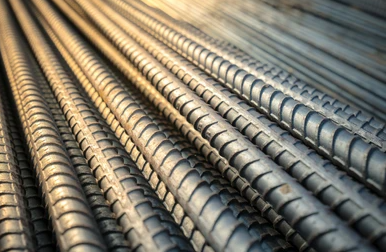Rebars: Strengthening Concrete for Safe and Durable Construction

In construction, the materials used determine the safety, durability, and strength of a structure. Concrete, known for its compressive strength, is vulnerable to tension and can crack under pulling forces. This is where rebars (reinforcement bars) come in, providing the tensile strength needed to prevent damage. Rebars, typically made of steel, are used in concrete to enhance its ability to withstand various stresses. In this article, we’ll discuss the significance of rebars in construction, the different types available, and their role in improving structural integrity.
What Are Rebars?
Rebars are steel bars embedded in concrete to reinforce and improve its tensile strength. Concrete is strong when compressed but fails when tension is applied, causing cracks. Rebars help counteract these forces, making the concrete more durable. The surface of rebars is usually ribbed, which allows them to bond more effectively with the concrete and stay in place during curing.
The ribbed texture of rebars enhances their grip on the surrounding concrete, ensuring the two materials work together effectively and the structure remains strong over time.
Why Are Rebars Essential in Construction?
Rebars are vital in nearly all construction projects, from residential buildings to bridges, highways, and industrial facilities. They provide the much-needed tensile strength that concrete lacks. Without rebars, buildings would be unable to withstand external forces such as earthquakes, wind, or the weight of the structure itself.
For instance, in multi-story buildings, the concrete foundation and lower floors experience tension, while the upper floors are under compression. Rebars are placed strategically to prevent cracks and distribute these forces, ensuring the structure remains intact over time.
Types of Rebars
Several types of rebars are used, depending on the specific needs of the project:
-
Mild Steel Rebars: Commonly used in general construction, mild steel rebars offer flexibility and good strength for projects like residential buildings and sidewalks.
-
High Strength Deformed Bars (HYSD): These rebars offer higher strength and are used in structures like bridges and industrial buildings. The deformations in these bars improve their bond with concrete, enhancing performance under tension.
-
TMT Bars (Thermo-Mechanically Treated Bars): TMT bars are made through a special heat treatment process, offering high tensile strength and flexibility. They are ideal for high-rise buildings, dams, and bridges, providing resistance to corrosion, especially in coastal areas.
-
Epoxy-Coated Rebars: These rebars are coated with a protective layer of epoxy to prevent corrosion. They are commonly used in areas exposed to harsh environments, such as coastal regions, where saltwater could corrode steel.
-
Stainless Steel Rebars: Known for their superior corrosion resistance, stainless steel rebars are used in specialized constructions like marine structures or in areas with extreme weather conditions.
Factors Affecting Rebar Prices
Several factors influence the cost of rebars:
-
Raw Material Costs: The cost of raw materials like steel and iron ore directly impacts the price of rebars. Steel price fluctuations often lead to variations in rebar prices.
-
Supply and Demand: The demand for rebars is closely tied to the construction industry. Large-scale infrastructure projects or urban development initiatives drive up demand and, consequently, prices.
-
Manufacturing Process: Advanced processes like producing TMT or epoxy-coated rebars add to the manufacturing cost, making them more expensive than regular mild steel rebars. However, they offer additional benefits like increased strength and corrosion resistance.
-
Transportation Costs: Rebars are heavy, and transportation costs play a significant role in the final price. Projects located far from production facilities may face higher delivery costs.
Benefits of Using Rebars in Construction
-
Increased Tensile Strength: Rebars help reinforce concrete by providing the tensile strength it lacks, preventing cracks and enhancing durability.
-
Cost-Effective Options: Mild steel rebars are affordable and commonly used in general construction. High-strength rebars, while pricier, provide superior performance for demanding projects.
-
Corrosion Resistance: Epoxy-coated and TMT rebars are resistant to corrosion, extending the lifespan of the structure and protecting it from rust and moisture damage.
-
Versatility: Rebars are used across various types of construction projects, from residential to industrial, offering flexibility in reinforcing concrete structures.
Conclusion
Rebars play a crucial role in reinforcing concrete structures, ensuring that buildings, bridges, and other infrastructures remain strong and durable. Whether you are building a house or a major industrial facility, choosing the right type of rebar is essential for the long-term safety and stability of the structure. Understanding the different types of rebars and the factors influencing their prices can help you make informed decisions for your construction projects.
For more information on rebars and other construction materials, visit SteelOnCall.com or contact us at 18008332929.
#Rebars #RebarsInConstruction #RebarTypes #RebarPrices #ConstructionMaterials
- Art
- Causes
- Crafts
- Dance
- Drinks
- Film
- Fitness
- Food
- Jogos
- Gardening
- Health
- Início
- Literature
- Music
- Networking
- Outro
- Party
- Religion
- Shopping
- Sports
- Theater
- Wellness


